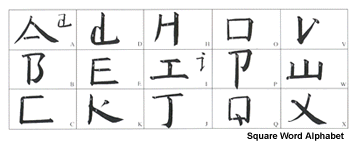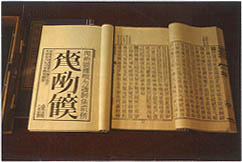 |
 VC: When you were growing up, the written language of China was in great flux. Mao declared the entire writing system would be simplified, so children in your generation were always being forced to learn new ways of writing characters. It was quite confusing for people. Is that experience part of this work too?
VC: When you were growing up, the written language of China was in great flux. Mao declared the entire writing system would be simplified, so children in your generation were always being forced to learn new ways of writing characters. It was quite confusing for people. Is that experience part of this work too?XB: Yes, of course, that is in there as well. It has do with the experience of my generation. We grew up during the Cultural Revolution. At the same time that we were learning how to read and write characters, the Communist Party was busy initiating reform of our language. We were constantly being faced with new characters and having to forget the old ones. Then we'd have more new ones and more to forget. Sometimes they would decide the new ones weren't any good and we'd have to go back to the old ones. It made a mess of our culture. VC: There were also all those political slogans written during that period, sometimes on banners, sometimes on walls, sometimes on posters.
 XB: The influence of words on my generation was especially powerful. Words alone could determine a person's fate. They could kill one person, and ensure a very good life for someone else. There was a saying then: "Pick up a pen, just as you would a knife or a gun." The idea was to show how powerful the pen can be. [Laughs and shakes his head]. My memory of life at that time is crowded with those written Chinese characters, from the sky to the ground, everywhere on the street, just everywhere, these big character posters and slogans. Also, anyone accused of being a member of the "Black Gang" [counter-revolutionary or bourgeois], including my own father, they would have to wear these dunce caps with insults on them and plaques on their chests with slogans on them. The effect is that you end up feeling that words are very powerful things.
 VC: If you had to describe yourself what words would you use? Chinese? Avant-garde? American? Immigrant? Intellectual? What do you feel you are?
XB: It would include all the things you just mentioned. When I spoke [at a recent exhibition] in Queensland I talked about how people of my generation went through 10 years of socialism, then 10 years under the Cultural Revolution, then 10 years of economic reform and openness. And now I've been living in the West for 10 years. People like me have a very complicated and yet a very rich and complicated background. We have survived in all kinds of environments and lifestyles. When you finally try to decide what your identity is, well, it makes it quite difficult.
XB: I am definitely Chinese. A Chinese artist. A lot of people ask me, "Are you an international artist or are you a Chinese artist?" But it's not either-or. I grew up in China, so I am a Chinese artist. Yet I am also an international artist, because I participate in the international art scene. I think the question is whether or not you are a good artist. VC: A lot of Chinese people your age feel a sense of responsibility to China. They feel China has social and cultural problems and they have a responsibility to fix them. Do you feel this sense of responsibility? XB: (Chinese) artists my age do all feel a sense of responsibility. Definitely. You can see it in the work. But if you're asking if I feel my work is done to reform or change society, then I don't think so. At least not directly. I feel I am finding a way to take what is very valuable in Chinese culture and bring those things into contemporary society. I think the real meaning of what I do is in that aspect of my work. For example I won the MacArthur Award in recognition of the way I am using ancient Chinese methods and forms to address and explore contemporary art. I feel that's what I am doing. VC: Aren't you also educating people and expanding the world's understanding of Chinese culture? XB: It can serve this purpose, but I am not intentionally trying to educate the world about Chinese culture. No, that's not it. I am using an Eastern cultural method to address contemporary questions. Contemporary art is of course led by the west but I think that it is missing a certain balance that traditional eastern cultures can provide. And I believe it will be both of these traditions that will contribute to our common culture in the future.
XB: Of course when I am working I consider how it will be received by
society and how it will impact society, whether or not it will have any
meaning or benefit to society. I consider whether or not it will be
meaningful or beneficial to people. I hope my work will reach the broadest spectrum of people possible, everybody from the art expert to the average person. I don't feel my work has a limited audience at all. I think if a person has any feeling at all they can appreciate my work. |
||||
Leisure: Music | Film | Travel | Food | Art | Books Home | Search | News | Trade | Finance | Infotech | Leisure | Shop |
||||
| ©1999 Virtual China, Inc. All rights reserved. | ||||
 VC: Have you reached any conclusions?
VC: Have you reached any conclusions?  VC: Your art is primarily for what audience, for whom? Do you
consider the audience when you do your work?
VC: Your art is primarily for what audience, for whom? Do you
consider the audience when you do your work?